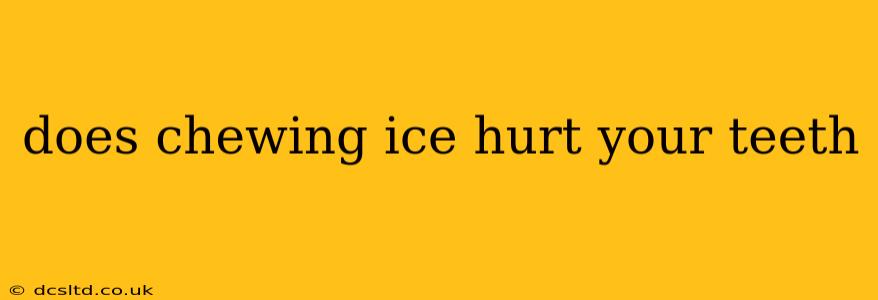Does Chewing Ice Hurt Your Teeth? The Chilling Truth
Chewing ice, that satisfying crunch, might seem harmless, but the truth is, it can significantly damage your teeth. While an occasional stray ice cube might not cause immediate harm, habitually crunching on ice puts your dental health at serious risk. This article delves into the potential consequences and provides advice on protecting your pearly whites.
What Happens When You Chew Ice?
The hard, crystalline structure of ice poses a significant threat to tooth enamel, the protective outer layer of your teeth. When you bite down on an ice cube, the force can fracture or chip your enamel, creating tiny cracks that are susceptible to decay and further damage. This damage can lead to increased sensitivity to hot and cold temperatures, pain, and even the need for extensive dental work. Think of it like repeatedly hitting a glass with a hammer – eventually, it will break.
Can Chewing Ice Break Your Teeth?
Yes, chewing ice can absolutely break your teeth. While a single instance might not cause immediate damage, the cumulative effect of regularly chewing ice can lead to cracks, chips, and even fractures. These fractures can be difficult to detect initially, but they can worsen over time, potentially requiring extensive dental procedures such as fillings, crowns, or root canals.
How Does Chewing Ice Affect Tooth Enamel?
As mentioned earlier, ice's hardness directly impacts the integrity of your enamel. The abrasion caused by chewing ice wears away the enamel, making your teeth more vulnerable to cavities and other dental problems. This erosion weakens your teeth, making them more prone to damage from other activities.
What are the Long-Term Effects of Chewing Ice?
The long-term effects of chewing ice can be severe. Consistent ice chewing contributes to:
- Increased Tooth Sensitivity: This is often one of the first signs of damage. You’ll experience discomfort when consuming hot or cold beverages.
- Cavities: Damaged enamel provides easier access for bacteria, leading to cavities and decay.
- Cracked or Chipped Teeth: This can lead to pain, infection, and the need for extensive restorative work.
- Tooth Loss: In severe cases, prolonged ice chewing can result in the eventual loss of teeth.
Is it Bad to Chew Ice Every Day?
Absolutely! Daily ice chewing dramatically increases your risk of all the problems listed above. It's a habit that should be avoided completely for the sake of your oral health.
How Can I Stop Chewing Ice?
Breaking a habit like ice chewing takes time and conscious effort. Here are some strategies:
- Identify Your Triggers: What situations or emotions lead you to chew ice? Understanding your triggers is the first step to breaking the habit.
- Find Healthy Alternatives: Satisfy your need for a crunchy texture with healthier options like carrots, celery, or even sugar-free gum.
- Stay Hydrated: Often, ice chewing is a response to thirst. Ensure you drink plenty of water throughout the day.
- Seek Professional Help: If you struggle to quit, consider talking to a therapist or dentist. They can offer additional support and guidance.
Your teeth are vital for chewing, speaking, and smiling. Protecting them is paramount. While the occasional accidental ice chip might be negligible, habitual ice chewing poses a significant risk to your long-term dental health. Make the conscious decision to protect your smile and avoid this damaging habit.
